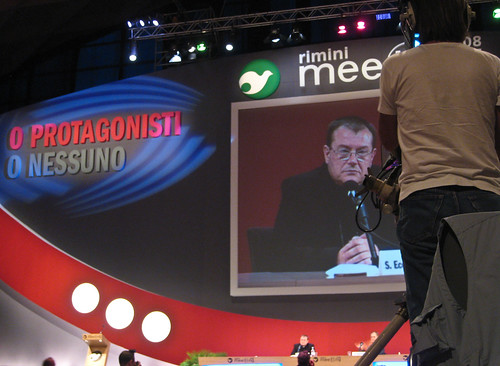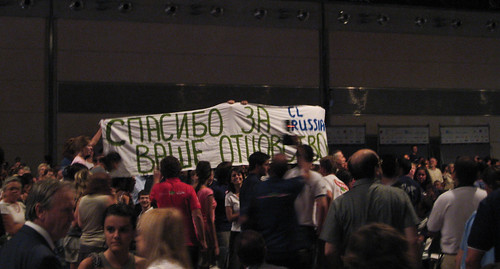

Archbishop Paolo Pezzi of the Priestly Fraternity of St. Charles Borromeo, newly elected to the Moscow diocese, addressed the huge crowd as one of the cielini. He recalled his own younger days of working at the meeting and setting up a stage similar to the one he was now speaking from.
He told us first that it is easy to work, to serve, to obey, as part of something bigger. Don’t tame life to make it easier. He said yes to the Mystery without being fully aware, but discovered over time the features, the face of Another. The real protagonists in history are those living a relationship with Christ.
When the Pope asked him to be the archbishop of Moscow, it was just a different task to serve the Mystery and to know whom to answer is to be free. It is to say yes to Christ just as when he was here setting up the stage. He is participating in a greater project.
We have to answer the mystery of God in the vocation of our lives, to respond constantly to the love that calls us. How can I serve the mystery or to say yes to God? We have the opportunity to remain forever young by saying yes to Christ, which is always yes to real persons and precise circumstances. These are much more than they appear as we become familiar with Christ and become certain of what is good even for those who are apparently against us. This is the ability to recognize Christ under the appearance of what is happening. We will judge persons and things in a different way. This is even to say yes to God when you’re stuck in traffic. We become more interested in finding Christ in circumstances rather than changing circumstances. This is what makes flowers grow in the most arid desert daily.
Many years ago, when he was about 13, his mother was ironing on a hot Sunday afternoon. He asked her why she was ironing when so many other mothers were at the cinema or having fun. She told him: So that I can raise you as good children according to the rule of God. Later in the movement he understood the profound answer by his mother.
Daily life is filled with arid things that are not passionate, even for a bishop, e.g. administration, bureaucracy. One can feel something like being stuck in traffic. Time elapses and it doesn’t change things. Instead, protagonism is offering, saying I offer this to you, Christ. You are the consistency of things. I don’t decide the circumstances. No matter what level you find yourself, you can always offer in any circumstance.
When the Pope appointed him as bishop of Moscow, one objection was that a foreign bishop was being appointed on Russian soil. When the objection was put to him, it was something radical. You feel foreign when you lose consciousness of Christ. Without this relation, he is foreign to myself, nothing is familiar. Familiarity with Christ makes you at home everywhere. What was asked of him was a new beginning. What does it mean to start, what is a new beginning?
A new beginning is not detachment from the past. Even if I conquer the whole world for the most just and beautiful cause, if I lose myself, if I didn’t have a place to go back, it is futile. He feels even more pressing the question how to answer God. Like Peter, Lord, I do not understand, but where can I go? This is an ingenious, profoundly human answer. Faith is an answer to the question of existence, to discover him as the constant answer to my humanity. This is a position of stupor, of the current event of Christ, the flavor of adventure, of life and mission.
He learned to appreciate that in brotherhood his vocation is completed. This is the awareness of a belonging to God that continues. When we don’t know who we belong to, we can’t touch dailyness. Then the day is a blackmail of things to do.
The Gospel of Mark says that the twelve were called to “be with him”, and to be sent daily in Christ. Otherwise living is calculation, rigidity, tiring, with a constant concern for everything. The struggle and vigilance is necessary to not give in to mundane logic.
Cardinal Ratzinger spoke of the loss of Christian identity, so that we don’t bring the reality of faith. The superiority of faith no longer emerges. So whenever there is a meeting there are the usual questions of celibacy, female priesthood. The Church continues to deal with itself. For many, mission is still something to justify, considered like a manhunt. Proselytism begins where mission ends.
Enthusiasm for Christ: I don’t propose myself but Someone Else. For the West mission means announcements, communication, gestures. For the East, mission is the transfiguration of our person with communion with Christ which draws the world to its center, learned from Giussani and others who make Christ fascinating.
After the CL meeting with the Pope last year, the archbishop wrote a letter to the Pope, grateful for how God had reached him through the Holy Father. And he offered himself to go anywhere he would be sent. What he most wants is the life of the other person, drawing people to the miracle of Communion, and this is the opposite of a solitary struggle. This is the preciseness of obedience, bending to circumstances rather than pursuing a project. This is a dramatic moment in the history of Russia.
The mission is to expand the mystery of God that makes me. In the mystery of Christ, everything consists in Him. As Solovyev wrote, what we have most dear in Christianity is Christ himself. Christ encompasses all, his wisdom and goodness. God is not extraneous. If we remove mission, what remains? Nothing. Man is his vocation, passion for the glory of Christ. The mission comes from love of Christ.
The love shown by Christ is yearning. The revelation of Christ removes all other yearning. We no longer live for ourselves but for a true communion toward which all work tends.
No comments:
Post a Comment